Bilha & Zilpa: Rejected!
There is a custom in many homes for the father -before kiddish is recited on Friday evenings- to bentch (bless) his children. This is accomplished when the father places both hands on each child (individually) and then, for his boys, he recites the words found in the heylige Toirah (Bereishis 48:20): “Yi’simcho Elokim K’Efrayim, V’chiMinashe” (May the RBSO make you as He did Ephraim and Menashe). If one is blessing a daughter, the words are Yi’simaych Elokim K’Soro, Rivka, Rochel, V’leah. These words are not scripturally based, ober are kimat universally accepted as the blessing for one’s daughters. Notice however that when benthcing the girls, there is no mention of Bilha and Zilpa, two of Yaakov’s four wives. Ober, why not? Were they not mothers to four -33%- of the illustrious 12 shvotim (tribes)? We shall explore that topic below, ober let’s begin with a roundup of last week’s parsha.
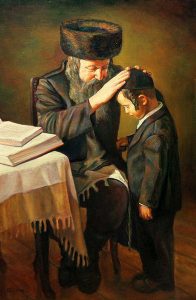 Last week: Yaakov, at the age of 77, arrived to Choron where he -after seven years of servitude- married Leah instead of Rochel, married his love interest Rochel one week later, and as a wedding gift from his shver (father-in-law) Lovon, also got Bilha as a handmaiden for Rochel. A week earlier, Yaakov also got Zilpa, she to serve as Leah’s maidservant. In short order, Leah got pregnant and delivered four children in record breaking pace -each after seven months of pregnancy, so the medrish and other sources tell us- while Rochel was nebech barren. Taking a page out of the Soro Emanu handbook for having children, Rochel -as did Soro back in parshas Lech Lecha when she told Avrohom to come upon Hogor, her handmaiden- told Yaakov to come upon Bilha in order for Rochel to be “built” up thorough Bilha’s having children. How that all works, ver veyst? How and why one’s wife feels built up and confident when her husband is bedding the shiksa resulting in pregnancy and birth from the housekeeper, ver veyst? The bottom line: At some point after Hogor gave birth to Yishmoel, Soro too conceived and gave birth to Yitzchok. And, at some point -seemingly very soon- after Bilha delivered two children to Yaakov, Rochel too became pregnant and delivered Yoisef, everyone’s favorite Toirah character and hero. And then? Was everyone happy? Seemingly not! Leah decided that her handmaiden too should have relations with Yaakov, why not? Compliant husband that he was, Yaakov ‘came upon Zilpa’ and she delivered two more boys. When all was said and done, and as last week’s parsha of Vayetzei was concluding, Yaakov had 11 boys, one girl and four wives. Does coming upon the handmaiden make her a wife? Indeed it did and so the heylige Torah told us. Yaakov took both Bilha and Zilpa as additional wives and that made four. Single until 84, as Vayetzei was closing out, Yaakov now approximately 97, was a real family man: likely the head of the first ‘Modern Family.’
Last week: Yaakov, at the age of 77, arrived to Choron where he -after seven years of servitude- married Leah instead of Rochel, married his love interest Rochel one week later, and as a wedding gift from his shver (father-in-law) Lovon, also got Bilha as a handmaiden for Rochel. A week earlier, Yaakov also got Zilpa, she to serve as Leah’s maidservant. In short order, Leah got pregnant and delivered four children in record breaking pace -each after seven months of pregnancy, so the medrish and other sources tell us- while Rochel was nebech barren. Taking a page out of the Soro Emanu handbook for having children, Rochel -as did Soro back in parshas Lech Lecha when she told Avrohom to come upon Hogor, her handmaiden- told Yaakov to come upon Bilha in order for Rochel to be “built” up thorough Bilha’s having children. How that all works, ver veyst? How and why one’s wife feels built up and confident when her husband is bedding the shiksa resulting in pregnancy and birth from the housekeeper, ver veyst? The bottom line: At some point after Hogor gave birth to Yishmoel, Soro too conceived and gave birth to Yitzchok. And, at some point -seemingly very soon- after Bilha delivered two children to Yaakov, Rochel too became pregnant and delivered Yoisef, everyone’s favorite Toirah character and hero. And then? Was everyone happy? Seemingly not! Leah decided that her handmaiden too should have relations with Yaakov, why not? Compliant husband that he was, Yaakov ‘came upon Zilpa’ and she delivered two more boys. When all was said and done, and as last week’s parsha of Vayetzei was concluding, Yaakov had 11 boys, one girl and four wives. Does coming upon the handmaiden make her a wife? Indeed it did and so the heylige Torah told us. Yaakov took both Bilha and Zilpa as additional wives and that made four. Single until 84, as Vayetzei was closing out, Yaakov now approximately 97, was a real family man: likely the head of the first ‘Modern Family.’
This week: Yaakov and Eisav, following a family feud which lasted 34 years, will reconcile. One kiss later and all was forgotten. Yaakov gets into a skirmish with an angel. The results: Yaakov gets a name change and we are forever forbidden from eating the “gid hanoshe” (the sciatic nerve). Dina, Yaakov’s only daughter, will get raped and worse. Shimon and Levi, the dynamic due, perhaps as young as 13 and under 14, will kill Shechem, his father and all males in the city of Shechem. They will also pillage the city. Binyomin is born, his mother Rochel dies. Reuvain beds Bilha, or not. In any event, Yaakov forgives him but does not forget the incident. Reuvain will be punished in a few weeks when we read parshas Vayichi. Yitzchok passes away, so does Devorah. Who is Devorah? That for another day.
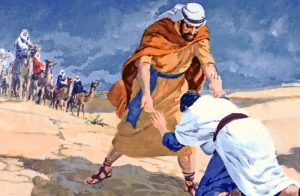 Several months back, the Oisvorfer made himself a note which read “Bilha and Zilpa, what become of them?” And the answer is: no one really knows. Why not? Ver veyst? Were these women -originally handmaidens but elevated to wife status- not the mothers of four of our holy and revered shevotim (tribes)? In fact, they were! And did Yaakov love the four boys they delivered? He did! Did they cause trouble? No! Did they -as did their older brothers born to Leah- wipe out an entire city of its inhabitants? They did not. Were they ringleaders in the plot to kidnap, kill, and then -instead- sell their brother Yoisef (Joseph) into slavery? They were not. They were good boys and men, Ober, are their mother’s Bilha and Zilpa considered Matriarchs, our foremothers? Not! Why not? Ver veyst? Were they fired? Were they but used as receptacles, surrogate mothers, and then discarded? Zicher they would have benefitted from a #MeToo movement. Bilha and Zilpa might have been its inaugural members. Were they analogous to character actors who pop into and out of a scene? If so, why? Did their boys receive a full portion of Yaakov’s inheritance? They did. Ober, why is it that we know nothing more about them? Taka all excellent questions.
Several months back, the Oisvorfer made himself a note which read “Bilha and Zilpa, what become of them?” And the answer is: no one really knows. Why not? Ver veyst? Were these women -originally handmaidens but elevated to wife status- not the mothers of four of our holy and revered shevotim (tribes)? In fact, they were! And did Yaakov love the four boys they delivered? He did! Did they cause trouble? No! Did they -as did their older brothers born to Leah- wipe out an entire city of its inhabitants? They did not. Were they ringleaders in the plot to kidnap, kill, and then -instead- sell their brother Yoisef (Joseph) into slavery? They were not. They were good boys and men, Ober, are their mother’s Bilha and Zilpa considered Matriarchs, our foremothers? Not! Why not? Ver veyst? Were they fired? Were they but used as receptacles, surrogate mothers, and then discarded? Zicher they would have benefitted from a #MeToo movement. Bilha and Zilpa might have been its inaugural members. Were they analogous to character actors who pop into and out of a scene? If so, why? Did their boys receive a full portion of Yaakov’s inheritance? They did. Ober, why is it that we know nothing more about them? Taka all excellent questions.
When did they die? Who buried them and where? We don’t know. Avada we all know that Leah is buried alongside Yaakov in the Meroas Hamachpelo over in Chevroin, and that Rochel is buried roadside over in Beis Lechem (Bethlehem), and that both sites are holy, and visited by tens of thousands of people yearly. Why is it that we cannot visit and pay our respects to the mothers of four of our illustrious tribes? Where are they? Why is it that kimat nothing is written about them?
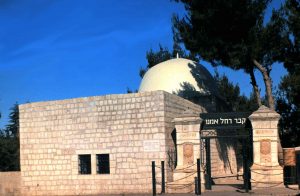 Earlier this week, as the Oisvorfer was reviewing the parsha and came across the Reuvain/Bilha bed myseh (scandal), one discussed by many an exegete, and the heylige Gemora which concludes that Reuvain was of course innocent of the charges and that all he did was, move the bed, mount the bed, or re-arrange the bed – a story you can zicher find (and should) in the archive section at www.oisvorfer.com, he checked several sources looking for references on these two great women. Sadly, all he found was the same few pisukim (verses) in the heylige Toirah that we all know. There is a reference but no mention of them by name in the heylige Gemora.
Earlier this week, as the Oisvorfer was reviewing the parsha and came across the Reuvain/Bilha bed myseh (scandal), one discussed by many an exegete, and the heylige Gemora which concludes that Reuvain was of course innocent of the charges and that all he did was, move the bed, mount the bed, or re-arrange the bed – a story you can zicher find (and should) in the archive section at www.oisvorfer.com, he checked several sources looking for references on these two great women. Sadly, all he found was the same few pisukim (verses) in the heylige Toirah that we all know. There is a reference but no mention of them by name in the heylige Gemora.
Wait: there’s more! Are any of your daughters named Bilha and Zilpa? Mistama not. It is a sad fact that not one Ashkenazic Jew has a daughter named either Bilha or Zilpa. So happens that the Oisvorfer does know one very nice woman by the name of Bilha, she of Sephardic decent. Ober, she is the only one he has ever met with that name. What’s pshat? Shouldn’t we all have Bilha’s and Zilpa’s? What about Bilha and Zilpa? Why are they excluded as if they were diseased? Why were they rejected? And the answer is: no one seems to know and few -no one- was bothered by these facts.
Shoin, while researching this topic, and still bothered by the lack of respect afforded these two great women, the Oisvorfer may have come up with a pshat he wove together from his read of various sources. To chap it, we will hark back and review a factoid known to all about at least three of our Matriarchs: they were barren. Each endured and went through some trauma before having a child. Shoin, let’s review a few critical pisukim. We all know that Soro was barren and so the heylige Toirah told us (Bereishis 16:1-2).
| 1. Now Soro, Avram’s wife, had not borne to him, and she had an Egyptian handmaid named Hogor. | אוְשָׂרַי֙ אֵ֣שֶׁת אַבְרָ֔ם לֹ֥א יָֽלְדָ֖ה ל֑וֹ וְלָ֛הּ שִׁפְחָ֥ה מִצְרִ֖ית וּשְׁמָ֥הּ הָגָֽר: | |
| 2. And Soro said to Avram, “Behold now, the Lord has restrained me from bearing; please come to my handmaid; perhaps I will be built up from her.” And Avram hearkened to Soro’s voice. | בוַתֹּ֨אמֶר שָׂרַ֜י אֶל־אַבְרָ֗ם הִנֵּה־נָ֞א עֲצָרַ֤נִי יְהֹוָה֙ מִלֶּ֔דֶת בֹּא־נָא֙ אֶל־שִׁפְחָתִ֔י אוּלַ֥י אִבָּנֶ֖ה מִמֶּ֑נָּה וַיִּשְׁמַ֥ע אַבְרָ֖ם לְק֥וֹל שָׂרָֽי: |
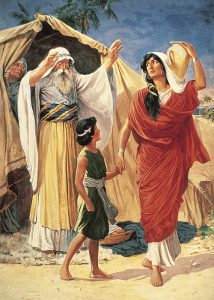
And taka that’s the reason she told our zeyda Avrohom to come upon Hogor. Soro suggested that she would be built up through Hogor. Avrohom did and shoin, Yishmoel was born. As an aside, she was discarded and worse. Soro had Avrohom throw Hogor and Yishmoel out of the house. Then again, her son Yishmoel was not the model citizen the RBSO had in mind when anointing the shevotim. On the other hand, the behavior of the “holy shevotim” wasn’t very exemplary -not at all- as we will learn this week and next. Shoin: who are we to judge? Do you want the RBSO judging you?
A few parshas later, we learned that Yitzchok, and Rivka were davening in opposite corners of the room. Why? Says the heylige Toirah (Bereishis 25:21), azoy:
| 21. And Yitzchok prayed to the Lord opposite his wife because she was barren, and the Lord accepted his prayer, and Rivka his wife conceived. | כאוַיֶּעְתַּ֨ר יִצְחָ֤ק לַֽיהֹוָה֙ לְנֹ֣כַח אִשְׁתּ֔וֹ כִּ֥י עֲקָרָ֖ה הִ֑וא וַיֵּעָ֤תֶר לוֹ֙ יְהֹוָ֔ה וַתַּ֖הַר רִבְקָ֥ה אִשְׁתּֽוֹ: |
And let’s go back one week to parshas Vayetztei where we learned that Yaakov spotted and then fell in love with Rochel at first sight. Says the heylige Toirah (Bereishis 29:31) azoy:
| 31. And the Lord saw that Leah was hated, so He opened her womb; but Rochel was barren. | לאוַיַּ֤רְא יְהֹוָה֙ כִּֽי־שְׂנוּאָ֣ה לֵאָ֔ה וַיִּפְתַּ֖ח אֶת־רַחְמָ֑הּ וְרָחֵ֖ל עֲקָרָֽה: |
The bottom line: Soro, Rivka and Rochel were all barren, that’s 75% of our foremothers. And if you read the very next few pisukim posik (Bereishis 29:32-35), we will find that Leah was anything but. She promptly delivered four boys to Yaakov. Seemingly she was a fertile myrtle and in the end -after a break of a few years, not many- she had two more boys and was the mother of six -that’s 50% if you are counting- of all our shevotim. Ober what has all this to do with Bilha and Zilpa? And why taka, as we asked above, are the names of Bilha and Zilpa not included when we bentch our daughters on Friday nights before kiddish? They were good wives and women.
Ober says the Seforno so mamish gishmak, that it’s efsher the case that Leah too was barren. She was? How may we consider her having been barren when we learn that she became immediately pregnant and gave birth to four before coming up for air? How do we conflate these two concepts? Says the Seforno that we must read verse 31 very carefully and so carefully that we shall repeat it here.
| 31. And the Lord saw that Leah was hated, so He opened her womb; but Rochel was barren. | לאוַיַּ֤רְא יְהֹוָה֙ כִּֽי־שְׂנוּאָ֣ה לֵאָ֔ה וַיִּפְתַּ֖ח אֶת־רַחְמָ֑הּ וְרָחֵ֖ל עֲקָרָֽה: |
Says the Seforno: Yaakov saw in Leah that she had signs of being barren. What that means, ver veyst? What he saw, how he saw, we don’t know. But let’s roll with the Seforno. Because Yaakov saw signs of barrenness in Leah, she perceived herself as being hated, and because she so perceived herself, the RBSO did something amazing: He opened up her womb. In other words: Yaakov -during intimacy on their wedding night, or even after, saw in her signs that she may have been barren. Perhaps he hated her, perhaps he felt fooled; he was – and who could blame him? At that point Leah felt hated. The RBSO then -as we read the words of the verse- came to the rescue and “her womb was opened.” She was now suddenly ready and able to conceive. Ober, the next words tell us that Rochel remained barren, unable to conceive.
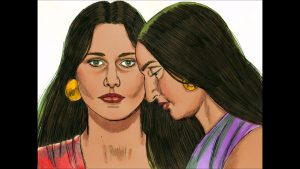 And? What about Bilha and Zilpa? Says Rabbi Art Scroll in his annotated notes to the blessing we give our girls on Friday nights, azoy: This blessing (of Yisimach Elokim, K’Soro, Rivka, Rochel, V’leah) is not a scriptural quote. We bless our girls to be like Soro, Rivka, Rochel and Leah because each of them grew up in alien surroundings, surmounted infertility and other distress to become mothers of the nation. And based on the Seforno we just read, it’s taka emes that Leah too was -at some point in time- barren. Shoin, now we chap: the only two women who had no issue becoming instantly pregnant were Bilha and Zilpa. Could overcoming barrenness have been a condition precedent to being considered for the matriarchy? Perhaps.
And? What about Bilha and Zilpa? Says Rabbi Art Scroll in his annotated notes to the blessing we give our girls on Friday nights, azoy: This blessing (of Yisimach Elokim, K’Soro, Rivka, Rochel, V’leah) is not a scriptural quote. We bless our girls to be like Soro, Rivka, Rochel and Leah because each of them grew up in alien surroundings, surmounted infertility and other distress to become mothers of the nation. And based on the Seforno we just read, it’s taka emes that Leah too was -at some point in time- barren. Shoin, now we chap: the only two women who had no issue becoming instantly pregnant were Bilha and Zilpa. Could overcoming barrenness have been a condition precedent to being considered for the matriarchy? Perhaps.
The bottom line: the heylige Oisvorfer has told you, his dedicated readers, as well as his newer ones, that real pshat is azoy: throughout Sefer Bereishis, as well as in other Seforim (all over Genesis and the other holy books), we will find those accepted and those rejected. Going back to Odom and Chava and their boys, the RBSO accepted Hevel’s korban (sacrifice) while rejecting Kayin’s. Sadly it cost Hevel his life as Kayin slew him. Noiach, following a despicable sex crime -Rashi tells us he was raped and efsher castrated by his own son- rejected Chom (Ham), as well as his grandson K’nan, minuvolim that they were. Soro rejected Hogor: twice. The RBSO accepted Avrohom but rejected Yishmoel. As between Yaakov and Eisav, Yaakov -using some trickery and other shenanigans walked away with the birthright and his father’s blessing. The RBSO accepted Yaakov and made him the father of all the shevotim. At the same time, Eisav was rejected. In the end, he lost his head which -according to the medrish- did roll into the Meoras Hamachapela. Leah was initially rejected as a wife, Rochel accepted. Bilha and Zilpa, though good women, and otherwise qualified -they too were Lovon’s children (from his own pilegesh (concubine))- were sadly rejected from the matriarchy. Why? It was all part of the RBSO’s master plan. It was also the RBSO’s plan -for reasons we don’t chap nor need to- for Lovon- the one person we shout out as being a very bad man -perhaps worse than Paroy himself- at the Pesach Seder yearly- to be the zeyda (grandfather ) of all the shevotim. Some yichus (pedigree)!
The bottom line: when it comes to yichus, it’s perhaps best to make your own! The RBSO runs the world as He sees fit. As to the rest of us, well, we just run around making believe we are busy making decisions.
Ober this past Tuesday evening, after the Oisvorfer had already written and sent this week’s review over to his webmaster, chaver Ephraim Frenkel who knew that the Oisvorfer was working on a piece about Bilha and Zilpa handed me a 35 page pamphlet he had in his possession for over two years. I began to peruse. And then I got to page 28. To my utter shock and astonishment I read these words “Four or six Matriarchs.” OMG! Is the RBSO great or what! Mamish knowing how I was struggling with this topic, trying to chap why these two good women were somehow rejected (by the Gemora in Brochis 16 which tells us that there are but three forefathers and four foremothers), He sent me a sholiach (messenger) with the most incredible paragraph I have read in years. Vus shtyt in dem shtikel (what does it say)? Nu, geloibt der Abishter (thank the RBSO). As it turns out, there is in fact rabbinic tradition, at least two, confirming that Bilha and Zilpa are counted: there are indeed six matriarchs. There are? Says Targum Yoinoson (as an aside, few commentators had his imagination), azoy: over in Shmois 14:21 we will be reading how Moishe stretched his hands over the sea. Let’s also read posik 16 wherein Moishe received final instructions on splitting the sea. Says the heylige Toirah (Shmois 14:16), azoy: “You should lift your staff and stretch out your hands over the sea and split it; the children of Israel will come into the sea on dry land.” Moishe did just that. The RBSO responded, sent a wind, and the seas split. Let’s read that posik innaveynig. Says the heylige Toirah (Shmois 14:21), azoy:
| 21. And Moses stretched out his hand over the sea, and the Lord led the sea with the strong east wind all night, and He made the sea into dry land and the waters split. | כאוַיֵּ֨ט משֶׁ֣ה אֶת־יָדוֹ֘ עַל־הַיָּם֒ וַיּ֣וֹלֶךְ יְהֹוָ֣ה | אֶת־הַ֠יָּ֠ם בְּר֨וּחַ קָדִ֤ים עַזָּה֙ כָּל־הַלַּ֔יְלָה וַיָּ֥שֶׂם אֶת־הַיָּ֖ם לֶחָֽרָבָ֑ה וַיִּבָּֽקְע֖וּ הַמָּֽיִם: |
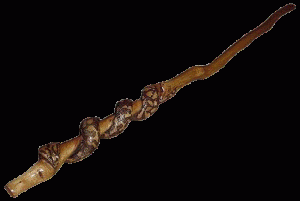 Said Yoinoson ben Uziel azoy: Moishe lifted his hands and followed the RBSO’s instructions on using his staff. And? On his staff were carved out -among other things- the name of the RBSO, the “three patriarchs, six matriarchs and the twelve tribes of Yaakov…” Do you hear this raboyseyee? Bilha and Zilpa were -at least on Moishe’s staff- listed as full fledged mothers, matriarchs. Givaldig! And very gishmak! Ober wait: there’s more.
Said Yoinoson ben Uziel azoy: Moishe lifted his hands and followed the RBSO’s instructions on using his staff. And? On his staff were carved out -among other things- the name of the RBSO, the “three patriarchs, six matriarchs and the twelve tribes of Yaakov…” Do you hear this raboyseyee? Bilha and Zilpa were -at least on Moishe’s staff- listed as full fledged mothers, matriarchs. Givaldig! And very gishmak! Ober wait: there’s more.
Says the medrish on Migilas Esther (Esther Rabba 1:12): there were six mothers. It doesn’t say that but it does say this. King Achashveyroish had many sons and each had many palaces. How many? Shoin, that depends on whom you ask. Ober one opinion stated in the medrish tells us that each had six. Why six? Several references to the number six are listed. Among them is that “six represents the six mothers” who gave birth to twelve heylige shevotim. Efsher you’re wondering why King Achashveyroish would have anything which resembled or symbolized Judaism in his palaces? Was he Jewish? Not! Ober says the medrish: Achashveyroish eyeballed the throne Shlomo Hamelech (King Solomon) sat on during temple times and had his people replicate it. Why? Ver veyst? Efsher he knew that one day he would be seducing and extending his royal scepter, if you chap, to a young Jewish maiden by the name of Esther? Also very gishmak. Someone was thinking that Bilha and Zilpa belonged.
And more good news: It turns out that if you wish to visit and pay your respects to Bilha and Zilpa -and you should- there is a tomb located in Tiverya (Tiberias) which is known as the ‘Tomb of the Matriarchs.’ There buried are Bilha, Zilpa, Yocheved, Moishe’s mother; Tzipoira, Moishe’s wife; Elisheva, Aharoin’s wife; and, Avigayil, one of Dovid Hamelech’s (many) wives. Gishmak! If you’ve been there, send me your pictures. They will be posted on the site.
Happy Thanksgiving and a gittin Shabbis!
The Heylige Oisvorfer Ruv
Yitz Grossman

